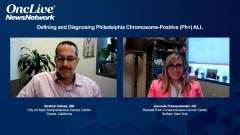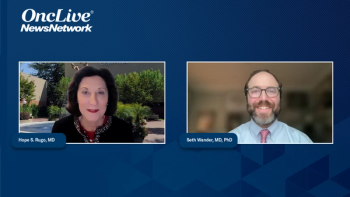
Unmet Needs and Treatment Trajectory for Patients Diagnosed with Ph+ ALL
With their final thoughts, medical experts share unmet needs in the treatment landscape of Ph+ acute lymphoblastic leukemia.
Episodes in this series

Amanda Przespolewski, DO: So, Dr. Aldoss, could you share with me what you think the future holds for patients with newly diagnosed pH-positive ALL? And can you share any unmet needs that these patients have?
Ibrahim Aldoss, MD: So, I really think this immune therapy as part of initial treatment for Philadelphia chromosome positive ALL will be a success in this population and we will have for the first time this scheme of therapy-free regimens for nearly diagnosed patient with ALL. The question is, with all these novel combination therapy, how durable these remissions and are the patient cure or not? And do we still need allergenic stem cell transplant as a consolidation or not? Until recently, allergenic stem cell transplant has been the standard of care for most adults with pH-positive ALL in contrast to children with pH-positive ALL. But now by learning which patient actually can be cured with tyrosine kinase regimens related to the early complete molecular emissions, lack of some high-risk genetics and maybe using more potent TKI in the frontline sitting, maybe we can spare some of these patients from the long-term complication of allergen stem cell transplant. So, this is a theme we have, all these encouraging data, but we need a longer follow-up to see that are these patients cured or not? Then I think one of the challenging subsets of pH-positive ALL is the patients who carry the IKZF deletion plus that has shown to adversely impact outcomes of patient treated with blinatumomab and dasatinib chemotherapy and dasatinib chemotherapy and ponatinib. We don't have enough data yet about ponatinib and blinatumomab if IKZF deletion plus still prognostic or not. But as of now, for this patient, because they seem to do poorly with current regimens, we still recommend transplant this patient when they achieve first remission. Another challenge with this disease is we're using more blinatumomab and third-generation tyrosine kinase inhibitors and the frontline sitting patient who relapse after these therapies, they will have limited options. We have CD19 CAR T-cell therapy, but since we're using blinatumomab as a frontline therapy subset of this patient, they will relapse as CD19 negative disease, and it'll be very challenging to treat these patients. So, we need clear novel therapies, a new generation of tyrosine kinase inhibitors that goes beyond ponatinib and can overcome the resistant to ponatinib. Now, there are some investigational agents are being used, there is third generation novel tyrosine kinase inhibitor like the HQP1351. There is more data actually in CML, but it seems it has also activity in relapse refractory pH-positive ALL for patients who fail prior ponatinib. What I see the futures, I think we going to keep actually bringing more novel therapy early in the treatment of pH-positive ALL-in adults with the goal that we can actually spare more patient from going through allogeneic stem cell transplant and avoid the complication of allogeneic stem cell transplant. For example, there is some early data from China looking at CD19 CAR T-cell therapy with tyrosine kinase inhibitor as a frontline therapy for nearly diagnosed pH-positive ALL. And although limited studies, limited follow-up, the data look very encouraging. So, this is where I see that as we have more successful treatment, salvage treatment, relapsed refractory sitting, are we able to move these medications as frontline therapy so we can actually prevent developing resistance mutation and curing more patients without transplant?
Amanda Przespolewski, DO: And one of the trials that I'd like to highlight is the group at Dana-Farber is currently leading a phase one study evaluating asciminib, which is a potent specific inhibitor of the BCR-ABL domain. And this agent has a distinct allosteric mechanism of action, which is defined to demonstrate efficacy against patients with BCR-ABL mutations that confer resistant to the standard TKIs, just as you were saying. So, this agent is being evaluated in combination with dasatinib and prednisone for patients with newly diagnosed pH-positive ALL as well as those patients with CML and lymphoid blast crisis. So, this kind of a regimen is very attractive because it's all oral. The accrual right now is still in the early phases, but the responses do appear promising. So, I'm encouraged by that and looking forward to the data to be presented in full.

































